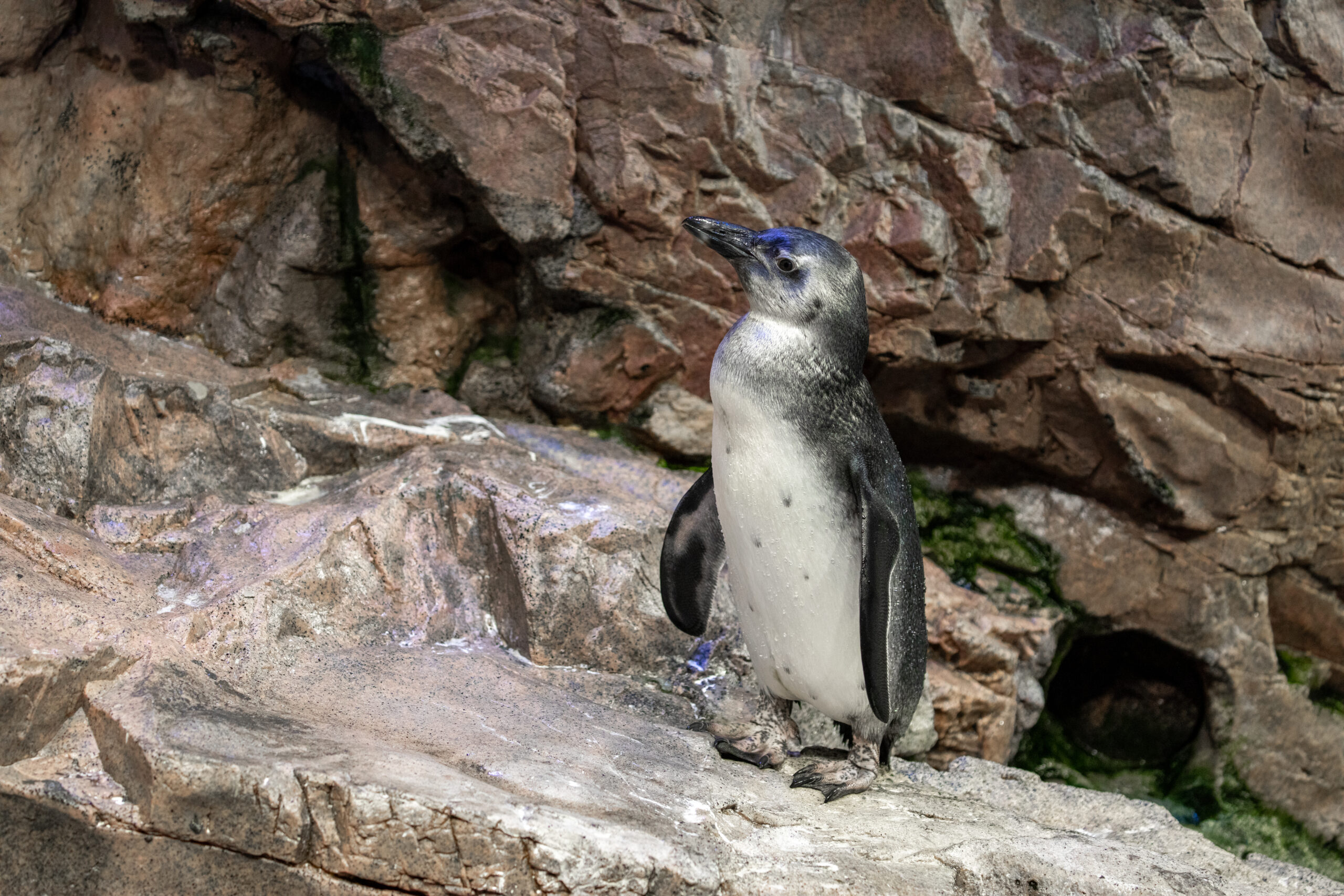
BOSTON, MASS. (June 20, 2024) – Visitors to the New England Aquarium can now see two African penguin chicks on exhibit after they joined the rest of the penguin colony following months of care behind the scenes.
*PHOTOS AND VIDEO AVAILABLE HERE WITH CREDIT TO NEW ENGLAND AQUARIUM*
The oldest chick, a male named “Bunker,” hatched at the Aquarium on March 21, 2024, and can be identified by the brown bracelet on his left wing. His sister, “Althea,” followed on March 27 and now sports a yellow bracelet on her right wing. Born to experienced penguin parents Malgas II and Demersus III, both chicks have been thriving and now weigh about 40 times their hatch weight.
“It’s incredibly rewarding to watch our penguins grow from tiny fluffballs that can fit in the palm of a hand to the adult-sized juveniles that they are today. Not only does it show the dedication of our Animal Care team, it’s also part of a much greater mission: To help support the Species Survival Plan for this endangered species. Knowing that African penguins could go extinct as soon as 2035, these chicks are a reminder that we are taking direct action toward the conservation of their species,” said Eric Fox, assistant curator of penguins.
The chicks’ names have an educational and conservation tie. The origin of “Bunker” comes from ship-to-ship bunkering along the southern coast of Africa, which presents a significant threat to endangered African penguins because of increased noise pollution, vessel traffic, and oil pollution. “Althea” is named after Althea Westphal, founder of a rescue and rehabilitation organization for African penguins and other seabirds called Southern African Foundation for the Conservation of Coastal Birds (SANCCOB).
Over the past three months, the chicks have learned to eat full fish from trainers, preparing them to join the full penguin colony. Trainers have also focused on using enrichment to prepare the birds for medical examinations and treatments.
“Our trainers will continue to work on building relationships with the chicks as part of our focus on animal wellbeing and husbandry. A key aspect of that work entails training the birds to be more comfortable with handling so that things like routine medical exams are a more positive experience,” Fox said.
As part of the acclimation process, trainers worked on socialization by slowly introducing the chicks to adult birds. Once their waterproof feathers came in, the chicks learned to swim by starting with a kiddie pool behind the scenes and working their way up to larger tubs and eventually trial swims inside the penguin exhibit. Getting accustomed to the exhibit involves interacting, exploring, and navigating the islands of the African penguin habitat.
Bunker and Althea are two of four chicks that hatched at the Aquarium this year. The others hatched in April and will be ready to join the colony sometime in July.
African penguins are an endangered species that inhabit the coasts of South Africa and Namibia, which are threatened by the depletion of food from overfishing, climate change, and pollution. The Aquarium recently joined the Association of Zoos and Aquariums (AZA) SAFE African Penguin program, an international effort to protect and restore wild African penguin populations. The Aquarium also participates in the AZA’s African Penguin Species Survival Plan, which supports field conservation efforts and a thoughtful breeding program to help promote a sustainable future for these endangered penguins.
“At the New England Aquarium, our first priority is the welfare and wellbeing of all of our animals. Participating in the SAFE African Penguin program and breeding season are key goals in providing top notch care for our penguin colony. It also gives the penguin trainers the unique opportunity to learn how to care for the birds at all life stages,” said Kristen McMahon, the Aquarium’s curator of pinnipeds and penguins.
MEDIA CONTACT: Pam Bechtold Snyder, psnyder@neaq.org; 617-686-5068
